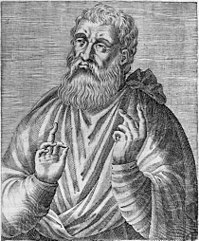Justin Martyr
| Saint Justin Martyr | |
|---|---|

Saint Justin Martyr
|
|
| Martyr | |
| Born | 100 Flavia Neapolis, Samaria (modern-day Nablus) |
| Died | 165 (aged 65) Rome, Roman Empire |
| Venerated in |
Roman Catholic Church Anglican Communion Eastern Orthodox Church Lutheranism Oriental Orthodoxy |
| Canonized | Pre-Congregation for the Causes of Saints |
| Feast | 1 June (Roman Catholic Church, Eastern Orthodox Church, Anglican Communion) 14 April (Roman Calendar, 1882–1969) |
Saint Justin, also known as Justin Martyr (Greek: Ιουστίνος ο Μάρτυρας, Latin: Iustinus Martyr) was an early Christian apologist, and is regarded as the foremost interpreter of the theory of the Logos in the 2nd century. He was martyred, alongside some of his students, and is considered a saint by the Roman Catholic Church, the Anglican Church, the Eastern Orthodox Church,. and the Oriental Orthodox Churches.
Most of his works are lost, but two apologies and a dialogue did survive. The First Apology, his most well known text, passionately defends the morality of the Christian life, and provides various ethical and philosophical arguments to convince the Roman emperor, Antoninus, to abandon the persecution of the fledgling sect. Further, he also indicates, as St Augustine did regarding the "true religion" that predated Christianity, that the "seeds of Christianity" (manifestations of the Logos acting in history) actually predated Christ's incarnation. This notion allows him to claim many historical Greek philosophers (including Socrates and Plato), in whose works he was well studied, as unknowing Christians.
Justin Martyr was born at Flavia Neapolis (today Nablus) in Samaria into a pagan family, and defined himself as a Gentile. His grandfather, Bacchius, had a Greek name, while his father, Priscus, bore a Latin name, which has led to speculations that his ancestors may have settled in Neapolis soon after its establishment or that they were descended from a Roman "diplomatic" community that had been sent there.
...
Wikipedia
